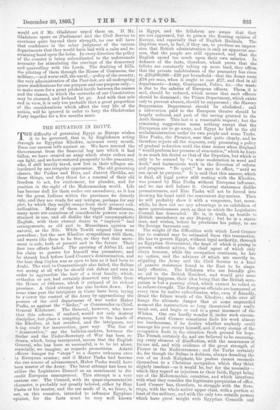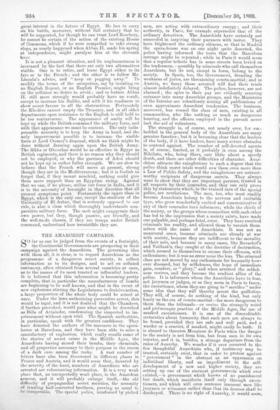THE SITUATION IN EGYPT. T HE difficulty of governing Egypt as
Europe wishes it to be governed, that is, by Englishmen acting through an Egyptian Khedive, increases every month. Even our success tells against us. We have rescued the Government from the financial bog into which it had fallen, we have created an army which obeys orders and can fight, and we have restored prosperity to the peasantry, who, if still heavily taxed, now live in their villages un- burdened by any irregular oppression. The old governing classes, the Pashas and Bays, and district Sheikhs, see these things, and they thirst for a renewal of their old freedom to act, for excitement, for plunder, and for position in the sight of the Mahommedan world. Life has become dull for them under our ascendency, as it has for the great Indians within the provinces we directly rule, and they are ready for any intrigue, perhaps for any plot, by which they might escape from their present sub- ordination. Many of them are bigoted Mussulmans, many more are conscious of considerable powers now re- strained in use, and all dislike the rigid unsympathetic English, with their eternal desire to " improve " bad arrangements, as old and in Mussulman qpinion as natural, as the Nile. While Tewfik reigned they were powerless ; but the new Khedive sympathises with them, and wants like them to be free, so they feel that move- ment is safe, both at present and in the future. Their first two efforts failed. The uprising of Abbas II. and his claim to govern for himself was premature, and he shrank back before Lord Cromer's determination, and the hint that Ceylon was as open to him as it had been to Arabi. The visit to Constantinople also failed, the Sultan not seeing at all why he should risk defeat and ruin in order to aggrandise the heir of a rival family, which, orthodox or not, had certainly deserved very little from the House of Otbman, which it stripped of its richest province. A third attempt has also broken down. For some time past the intriguers in Cairo have been trying to recover the control of the Army by aggrandising the powers of the civil department of war under Maher Pasha, as against the " Sirdar," or Commander-in-Chief, General Kitchener. The General, however, who knew that this scheme, if realised, would not only destroy discipline, but place a tempting weapon in the hands of the Khedive, at last revolted, and the intriguers, not b-ing ready for insurrection, gave way. The line of " demarcation," say the bulletin-makers, between the Sirdar and the Under-Secretary of War has been re- drawn, which, being interpreted, means that the English. General, who has been so successful, is to be let alone, especially, we imagine, as regards promotions. Asiatic officers hunger for " steps " to a degree unknown even in European armies ; and if Maher Pasha had become the one source of advancement, Maher Pasha would have been master of the Army. The latest attempt has been to utilise the Legislative Council as an instrument to dis- credit European management. This attempt is a very curious one. The Council, with its quasi-representative character, is probably not greatly beloved, either by Riaz Pasha or his master, and the use made of it, we fancy, is not, on this occasion, intended to influence Egyptian opinion, for the facts must be very well known in Egypt, and the fellaheen are aware that they are not oppressed, but to poison the floating opinion of Europe, and especially that of English Radicals. The Deputies want, in fact, if they can, to produce an impres- sion that British administration is only an apparent suc- cess, that the people are still oppressed, and that the English spend too much upon their own salaries. In defiance of the facts, therefore, which prove that the fellahs are constantly taking up more land, they affirm that the private indebtedness of the peasantry has risen to £20,000,000—£20 per household—that the Army costs £34 per man, when it ought to cost £27, and that in all departments—Army, Coastguard, Police, &c.—the waste is due to the salaries of European officers. These, it is said, should be reduced, which means that such officers should be dismissed ; the Prison Department, which exists only to prevent abuses, should be suppressed ; the Slavery Suppression Department should be abolished ; and a subvention paid to the European theatre should be largely reduced, and part of the saving granted to the Arab theatre. This last is a reasonable request ; but the remaining suggestions mean nothing except that the Europeans are to go away, and Egypt ho left to the old maladministration under its own people and some Turks. Riaz Pasha, the Premier, sees that quite clearly, and he therefore rejects all the requests, only promising a policy of gradual reduction until the time comes when England " would perform her promise of evacuation," which he hints is as much his desire as that of the Deputies, but which is only to bo secured by " a wise moderation in word and deed," and harmonious work in the direction of reform and progress. " Be quiet," he says in effect, " until we can speak to purpose." It is said that this answer, which is final, all legal power still resting with the Khedive, was penned by Riaz Pasha without European influence, and we can well believe it. Oriental statesmen dislike prematureness, and Riaz Pasha will not be forced into showing his hand until the convenient day arrives. Then he will probably show it with a vengeance, but, mean- while, he does not see any advantage in an exhibition of mere querulousness such as that to which the Legislative Council has descended.' He is, in truth, as hostile to British ascendency as any Deputy ; but he is a states- man, and wishes, before he proclaims his policy, to see the foreign bayonets out. The weight of the difficulties with which Lord Cromer has to contend may be estimated from this transaction. He has to govern Egypt, without legal authority, through an Egyptian Government, the head of which is pining to govern without advice, the chief agent of which only obeys because, while the occupation continues, he has no option, and the advisers of which are secretly in- stigating the Army and the Civil Service to a kind of passive resistance found in the East to be singu- larly effective. The fellaheen who are friendly give no aid to the British Resident, and would give none whatever happens, their idea being that the British occu- pation is but a passing cloud, which cannot be relied on to relieve drought. The European officials are hampered at every turn by native subordinates, who, even if friendly, dread the future wrath of the Khedive; while over all hangs the ultimate danger that at some unguarded moment the insurrection so long threatened may really break out, and begin or end in a great massacre of the Whites. One can hardly wonder if, under such circum- stances, Lord Cromer sometimes finds his work almost too burdensome, if he doubts whether anybody could manage his post except himself, and if every enemy of the occupation finds in the situation fresh ground for hope. The French certainly do, and are believed to be encourag- ing every element of disaffection, with the assurances of future aid, and with evidence of the great strength of France in the Mediterranean ; and the Turks certainly do, for though the Sultan is dubious, always dreading the rise of an Arab ICaliphate, his pashas cannot reconcile themselves to a Christian occupation which they think Slightly insolent—as it would be, but for the necessity— which they regard as injurious to their faith, Egypt being one of the Mahommedan countries, and which interferes with what they consider the legitimate perquisites of office. Lord Cromer has, therefore, to struggle with the Sove- reign, with the whole native upper class, with a portion at least of the military, and with the only two outside powers which have great weight with Egyptian Colinas and great interest in the future of Egypt. lie has to carry on his battle, moreover, without full certainty that he will be supported, for though he can trust Lord Rosebery, he cannot be certain of the action of the existing House of Commons, which if he were compelled to take strong steps, as nearly happened when Abbas IL made his spring at independence, might paralyse him at the eleventh hour.
It is not a pleasant situation, and its unpleasantness is increased by the fact that there are only two alternatives visible. One is to retire, and leave Egypt either to its fate or to the French ; and the other is to follow Mr. Lincoln's advice, and " keep on pegging away." To modify the terms of the occupation, say by insisting on an English Regent, or an English Premier, might bring on the collision we desire to avoid ; and to lecture Abbas IL still more strongly would probably have no result, -except to increase his dislike, and with it his readiness to :show secret favour to all the obstructives. Fortunately the Khedive cannot empty the Treasury, and in all other -departments open resistance to the English is still held to be too venturesome. The appearance of amity will be kept up while the British command the military force, and with that appearance we must be content. The only indis- pensable necessity is to keep the Army in hand, and the only improvement possible is to increase the visible force at Lord Cromer's disposal, which we think might be done without drawing again upon the British Army. ' The Sikhs or Ghoorkas would bo as effective in Egypt as British regiments, and there is no reason why they should not be employed, or why the garrison of Aden should not be kept up in rather fuller strength. We are slow to believe that the French will move at present, strong though they are in the Mediterranean ; but it is foolish to forget that, if they meant mischief, nothing could give them more support than an Egyptian rising. Against that we can, if we please, utilise our force in India, and it is to the necessity of foresight in that direction that all present symptoms point. Fortunately the upper class in Egypt, which is the only one,. except the students of the University of El Azhar, that is seriously opposed to our rule, is also a. class which thoroughly understands com- parative military force. The mob might exaggerate their own power, but they, though passive, are friendly, and the well-to-do classes, if they see troops under British command, understand how irresistible they are.



































 Previous page
Previous page